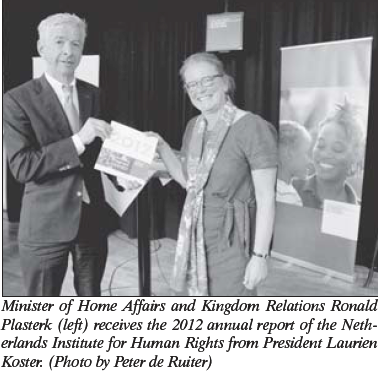The Netherlands Institute for Human Rights wants the Dutch government to safeguard a decent standard of living for all people on Bonaire, St. Eustatius and Saba and protect the rights of suspects and detainees on the islands. According to the Human Rights Institute, every human being has a right to a decent standard of living. “People can’t live a free life without sufficient food, clothing and decent housing,” stated the organisation in its 2012 annual report, which was presented to Dutch Minister of Home Affairs and Kingdom Relations Ronald Plasterk on Monday. Human rights treaties oblige The Netherlands to take measures to safeguard a better standard of living, also in the Dutch public entities Bonaire, Statia and Saba. The standard of living on the islands is under pressure because of the increased cost of food, clothing, utility prices and housing. The organisation pointed out that raising the general wellbeing of the people on Bonaire, Statia and Saba with a “facilities level that would be acceptable within The Netherlands” was the point of departure when the islands became part of The Netherlands on October 10, 2010.
So far, only the Dutch Ministries of Education OCW and Public Health VWS have drafted norms for an acceptable facilities level. Norms have yet to be defined in the areas of social security and justice. The Human Rights Institute asked the Dutch government to implement specific policies aimed at offering the islands a decent standard of living to improve the prosperity and wellbeing of every resident in the Caribbean Netherlands.
The organisation also expressed concerns about the limited rights of suspects and detainees from Statia and Saba. The two islands don’t have prison facilities, while Statia only has approved police cells. The police cells on Saba will be reconstructed in accordance with human rights norms. Suspects from Saba will continue being transferred to Statia within 24 hours of their detention until the renovation of the Saba police cells has been completed. Suspects locked up in a police cell on Statia often don’t make use of their right to a lawyer before the hearing by the Judge of Instruction. They often waive this right. Suspects on Statia and Saba rely on lawyers from St. Maarten as the islands don’t have a permanent lawyer. The suspects often don’t see the lawyer in person, but communicate with them via telephone or video-conferencing. According to the Human Rights Institute, lawyers are not very enthusiastic about defending their clients over the phone or via video-conferencing. Another constraint is that lawyers only receive a limited number of air tickets to visit their client. Lawyers receive one ticket during the pre-investigation of their client and another one for the Court session, but there is no compensation for the cost incurred during their stay on the island. Taking the entire situation of Statia and Saba suspects into consideration, the Human Rights Institute doubted whether the international human right to free access to a lawyer is sufficiently secured on the Caribbean Netherlands.
The organisation is further worried about the limited contact of family members with suspects or detainees from Statia and Saba. Suspects of the two islands are transferred to the prison on Bonaire after 18 days of pre-trial detention. There, they also do their time in jail after sentencing. During the visit of representatives of the institute to the public entities in 2012, it became clear that the cost of the air tickets from Statia and Saba to Bonaire is a limiting factor for family members who want to visit detainees. “As a result, the detainees receive few visitors while they are already in a strange environment and often have to deal with the language barrier.” The Human Rights Institute urged the Dutch government to look into facilities that can contribute to safeguarding the right of a private and family life for detainees from Statia and Saba while they are in prison on Bonaire.
The organisation further addressed the drafting and implementation of legislation in the Caribbean Netherlands. The organisation wants The Hague to precisely motivate the reasons for drafting and implementing different laws and regulations for the islands. Also, the effects of new laws and regulations for the islands have to be carefully weighed. The institute wants the “essential level of human rights guaranteed.”
 Archive of posts from Saba-News.com Archive Saba News
Archive of posts from Saba-News.com Archive Saba News
